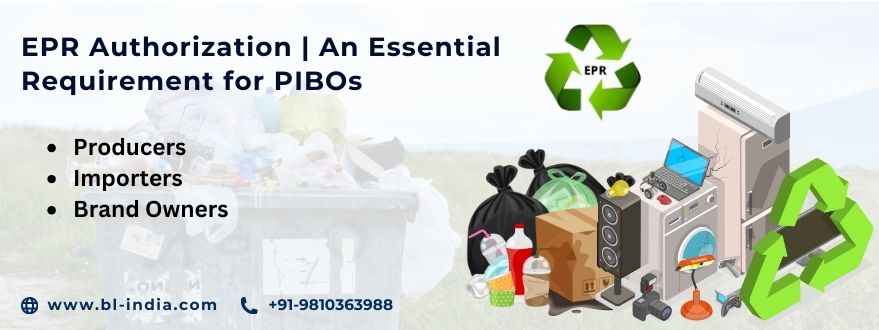
As technology evolves at an unprecedented pace, the issue of electronic waste (e-waste) has become a pressing concern globally.
In response to this, India has introduced the concept of Extended Producer Responsibility (EPR) Authorization to ensure that Producers, Importers, and Brand Owners (PIBOs) take responsibility for the entire life cycle of their electronic products.
EPR Authorization has emerged as a crucial requirement in India, shaping the way electronic waste is managed and disposed of.
EPR, which stands for Extended Producer Responsibility, is a fundamental requirement for Producers, Importers, and Brand Owners (PIBOs) involved in the generation of Plastic, Battery, or e-waste in India.
This mandate is outlined by the guidelines of the Central Pollution Control Board (CPCB) under the Ministry of Forest and Climate Change. EPR Authorization is a critical aspect for businesses, compelling them to adopt sustainable development practices in line with the Swachh Bharat Abhiyan initiated by the Government of India.
CPCB's EPR Registration online process facilitates the enrollment of PIBOs for EPR Authorization, ensuring compliance with annual EPR obligations.
Failure to adhere to CPCB guidelines or neglecting to register under EPR may lead to penalties imposed by the Central Pollution Control Board, emphasizing the significance of responsible waste management and environmental stewardship in India.
There are three distinct types of EPR Authorization based on the classification of hazardous waste as outlined by the CPCB in India:
EPR Authorization for Plastic Waste
As per the CPCB guidelines, EPR Authorization for plastic waste encompasses any discarded, used, or abandoned plastic material, including all plastic products, plastic packaging, and items that have reached the end of their useful life. This category covers a broad spectrum of plastic materials, including bottles, containers, packaging films, bags, toys, electronic goods, and various other plastic products. PIBOs dealing with plastic waste must obtain EPR Authorization to fulfil their responsibility for the sustainable management of plastic waste.
EPR Authorization for Battery Waste
The EPR Authorization for battery waste pertains to any waste generated through batteries or any product containing batteries. Batteries, due to their hazardous nature, require specific handling and disposal methods to prevent environmental contamination. PIBOs involved in the production, import, or branding of products containing batteries are obligated to secure EPR Authorization for responsible battery waste management.
EPR Authorization for E-waste
In line with the E-waste Management Rules 2022, released on November 2, 2022, under the Ministry of Environment, Forest and Climate Change, importers, producers, and brand owners of electronic products are required to obtain EPR Authorization for E-waste management. This category encompasses a wide range of electronic devices, gadgets, and appliances. The EPR certification for PIBOs dealing with electronic products is essential for them to operate legally in India and actively contribute to the environmentally sound disposal and recycling of electronic waste.
EPR Registration is mandatory for PIBOs in India, issued by the CPCB guidelines, aligning with the nation's commitment to responsible waste management and sustainable development.
The process of obtaining the EPR Certificate in India involves a structured process that PIBOs must follow:
Step 1: Self-Assessment
Conduct a thorough assessment of your products, production processes, and potential environmental impact.
Step 2: Submit Application
Prepare and submit a detailed application to the regulatory authority, including information about your products and proposed waste management plans.
Step 3: Regulatory Evaluation
The regulatory authority evaluates your application, ensuring alignment with CPCB guidelines and commitment to responsible practices.
Step 4: Approval and Certificate Issuance
Upon successful evaluation, CPCB issues the EPR Certificate, officially recognizing your commitment to responsible waste management.
To get the EPR Certificate, PIBOs need to submit a set of essential documents, such as:
Provide official documents verifying the legal registration of the business entity, such as the certificate of incorporation.
Comprehensive information about the electronic or hazardous products, including specifications, quantity produced, and intended market.
A detailed plan outlining how the PIBO intends to manage and dispose of electronic or hazardous waste in an environmentally sound manner.
If opting for Collective Producer Responsibility (CPR), include agreements with other entities involved in the collective responsibility initiative.
Provide evidence of financial commitment to implementing the proposed EPR plan.
A formal undertaking document, where the PIBO acknowledges and commits to fulfilling its Extended Producer Responsibility obligations.
Ensure that the application adheres to the guidelines set by the Central Pollution Control Board (CPCB) or the relevant state pollution control boards.
Provide records of previous compliance with environmental regulations, to demonstrate a history of responsible business practices.
EPR Authorization in India is a critical step towards addressing the escalating issue of electronic, plastic and battery waste.
For PIBOs seeking a seamless and efficient journey through this regulatory process, Brand Liaison emerges as a trusted partner.
As a compliance consultant company dedicated to providing assistance and support, Brand Liaison has positioned itself as a facilitator, streamlining the complex procedure of obtaining EPR Certification.
With a focus on expediting the process while ensuring compliance, our team empowers manufacturers to meet their EPR obligations swiftly, contributing to a cleaner, greener, and more sustainable future for India.